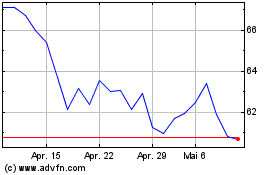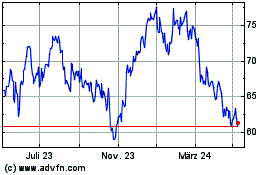Car-Parts Giant Pivots to Electric -- WSJ
08 August 2019 - 9:02AM
Dow Jones News
By William Boston
This article is being republished as part of our daily
reproduction of WSJ.com articles that also appeared in the U.S.
print edition of The Wall Street Journal (August 8, 2019).
BERLIN -- One of the world's biggest car-parts makers is
preparing for a future without the internal combustion engine --
the machine that has been at the heart of the auto industry for
well over a century.
In a major strategy shift, Continental AG said Wednesday that it
would cut investment in conventional engine parts because of a
faster-than-expected fall in demand as major auto makers accelerate
their shift to electric vehicles.
The move by the Hanover, Germany-based maker of tires,
lubricants, powertrains and other core components shows how tougher
regulation of greenhouse-gas emissions is pushing the industry
toward electric models and forcing manufacturers to redraw their
supply chains.
Continental said its board had voted to halt the expansion of
its hydraulics components business, largely focused on fuel
injectors and pumps for gasoline and diesel engines, to shift its
focus and future investments to components for electric
vehicles.
"The future is electric. We are convinced of this," said Andreas
Wolf, head of Continental's powertrain division, which is
reorganizing under the name Vitesco Technologies.
The auto industry's multiyear boom after the financial crisis
came to a sudden end this year, as trade conflicts and slower
economic growth caused new vehicle sales to start declining.
Analysts say 2018 marked not only a cyclical peak in sales of
new cars with internal combustion engines, but also likely was the
beginning of a decline in their share of the overall market.
AlixPartners, an auto industry consulting firm, predicts that the
combined share of gasoline and diesel engines in new car sales will
fall from 95% in 2018 to 56% by 2030, replaced by battery electric,
hybrid and plug-in hybrid vehicles.
The biggest shift is expected in Europe. Driven by tough limits
on greenhouse-gas emissions, forcing car makers to go electric, the
share of gasoline and diesel engines is expected to fall to 42% by
2030, compared with 59% in the U.S. and 50% in China.
Continental made the announcement as it released earnings for
the three months to the end of June, reporting a 41% drop in net
profit to EUR485 million ($543 million) and a 1% decline in sales
to EUR11.3 billion. It attributed the weakness in the second
quarter to a global slowdown in automotive production.
Mr. Wolf said that although the auto industry would continue to
use conventional internal combustion engines for many years, it was
becoming difficult to justify the high cost of improving components
to make gasoline and diesel engines less polluting.
As car makers accelerate development of electric vehicles and
demand fewer components for combustion engines, the traditional
business of suppliers like Continental promises to offer "only
selective growth opportunities" in the future, the company
said.
"Investments in research and development and in production
capacity for innovations are becoming less profitable," Mr. Wolf
said in a statement.
Write to William Boston at william.boston@wsj.com
(END) Dow Jones Newswires
August 08, 2019 02:47 ET (06:47 GMT)
Copyright (c) 2019 Dow Jones & Company, Inc.
Continental (TG:CON)
Historical Stock Chart
Von Mär 2024 bis Apr 2024

Continental (TG:CON)
Historical Stock Chart
Von Apr 2023 bis Apr 2024
